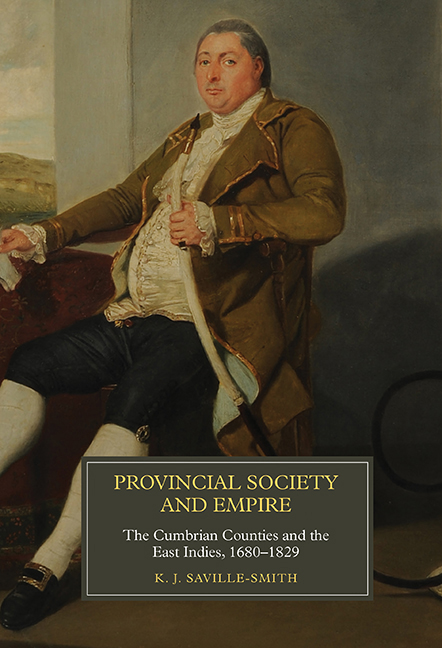Book contents
- Frontmatter
- Contents
- List of Illustrations
- Acknowledgements
- List of Abbreviations
- Glossary
- Chapter 1 The Provincial World and Global Encounters
- Chapter 2 Cumbrian Contexts, Patterns and Lives
- Chapter 3 Why Go to the East Indies?
- Chapter 4 ‘Passage to India’
- Chapter 5 Returning and Returns
- Chapter 6 Conclusion: ‘Use of Globes’
- Appendix A East Indies Enumerated Cumbrian Men
- Appendix B East Indies Enumerated Cumbrian Women
- Appendix C East Indies Women, Associated Cumbrian Men and Their Children
- Appendix D Hudleston, Kin Connections and the East Indies
- Appendix E East Indies connections of the Winders, Stephensons and Fawcetts
- Appendix F East Indies connections of the Braddylls, Wilsons and Gales
- Appendix G Kin Connections of Catherine Holme
- Appendix H Kin Connections of Thomas Cust
- Bibliography
- Index
- Miscellaneous Endmatter
Chapter 4 - ‘Passage to India’
Published online by Cambridge University Press: 18 April 2018
- Frontmatter
- Contents
- List of Illustrations
- Acknowledgements
- List of Abbreviations
- Glossary
- Chapter 1 The Provincial World and Global Encounters
- Chapter 2 Cumbrian Contexts, Patterns and Lives
- Chapter 3 Why Go to the East Indies?
- Chapter 4 ‘Passage to India’
- Chapter 5 Returning and Returns
- Chapter 6 Conclusion: ‘Use of Globes’
- Appendix A East Indies Enumerated Cumbrian Men
- Appendix B East Indies Enumerated Cumbrian Women
- Appendix C East Indies Women, Associated Cumbrian Men and Their Children
- Appendix D Hudleston, Kin Connections and the East Indies
- Appendix E East Indies connections of the Winders, Stephensons and Fawcetts
- Appendix F East Indies connections of the Braddylls, Wilsons and Gales
- Appendix G Kin Connections of Catherine Holme
- Appendix H Kin Connections of Thomas Cust
- Bibliography
- Index
- Miscellaneous Endmatter
Summary
Unworthy, brutish Captain Carter and an officer of his has been pleased to beat me abt purely to let me know their powers – John Addison, Whitehaven, 1720.
John Addison was one of many passengers on their voyage to or from the East Indies who protested treatment by the captains and officers of East Indiamen. Indeed, travellers’ anxieties about possible abuse was a theme that persisted across the long eighteenth century. Almost a century later Cruikshank caricatured the voyage (Plate 4.1) and Williamson's East India Vade Mecum provided extensive instructions about how to select a ship, a captain, fellow travellers and a cabin to avoid the journey to India becoming a nightmare of filth and mistreatment.
But the passage to India was not simply a matter of preparing for, or surviving, what could be a tedious, sometimes frightening and often uncomfortable trip. Travel to the East Indies was merely one, relatively brief, phase in a much more extended process. The high rate of Cumbrian engagement with the East Indies had its genesis in the comparatively high levels of educational achievement among young Cumbrians. They had to meet, too, the burden of the financial demands associated with preparation, fit-out, travel and the provision of venture capital for private trade. The passage to India was determined by the extent to which Cumbrian gentry and middling families could mobilise a network of friends to: gain patronage appointments into East India Company; financially support them in their East Indies venture; and provide care and support to preparations for an orderly and successful departure for and arrival in the East Indies. In short, the passage to India was paved by a complex interaction between what Bourdieu would describe as cultural, economic and social capital.
For Bourdieu, cultural capital is produced out of the intersection between family and the institutional structures of education. Cultural capital are assets in the form of competencies, qualifications and skills which allow (or deny) individuals opportunities to connect to the processes of economic capital accumulation. Cultural capital also provides the foundations of taste which, in turn, both constructs and maintains social distinctions. According to Bourdieu, social distinction feeds the processes of identity and identification that underpin institutionalised ‘relationships of mutual acquaintance and recognition’. It is those which bind class, kin and place networks together and generate social capital.
- Type
- Chapter
- Information
- Provincial Society and EmpireThe Cumbrian Counties and the East Indies, 1680–1829, pp. 97 - 130Publisher: Boydell & BrewerPrint publication year: 2018



